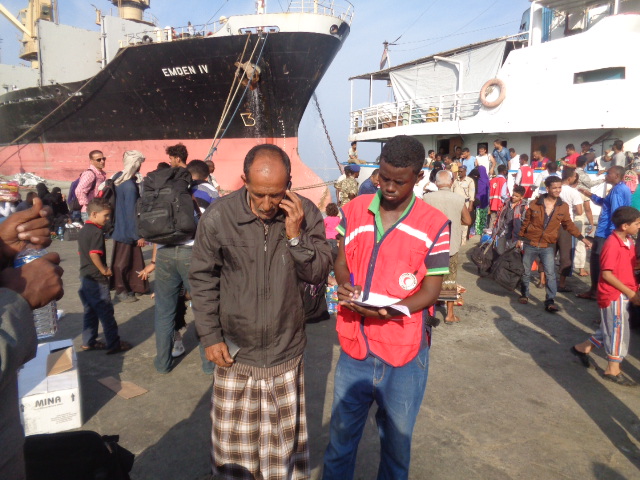What happens when a family flees one war zone only to end up in another war zone?
By the time her family decided to leave Yemen, the trappings of war were closing in, Faaiza Hassan, a Somalia mother of three, remembers. Heavy bombs and mortar shells were destroying houses and collapsing buildings all around them.
“There was confusion everywhere and dead bodies lying in the streets. I was left with no option but to escape,” says Faaiza. “I saw hospitals full of injured people.”
She looked at her two sons and daughter, all younger than 12, and wondered what the future held. She made up her mind to make the treacherous journey back home to Somalia, the country her family originally fled because of the violence there. Faaiza’s husband had returned to Somaliland in 2016 to pave the way for his family’s return. But soon after his arrival he contracted tuberculosis and died.
Faaiza and her children traveled to Aden, a Yemeni port town, after fleeing the war-wracked capital, Sanaa. The only way to cross the Gulf of Aden and return home was by cargo ship at a cost of USD 300.
“The ship was not designed to carry passengers, and there was cargo arranged everywhere. The thing l found most difficult was the poor sanitation facilities like toilets,” she says.
The family arrived in Berbera in July, and like many other new arrivals Faaiza and her children were met by the staff and volunteers of the Somali Red Crescent Society (SRCS). The port of Berbera is near the southern part of the Gulf of Aden, where the SRCS has assisted in the arrival of close to 12,000 people fleeing the conflict in Yemen since 2015, including 2,000 people in 2016
The majority of those arriving are Yemeni and Somali nationals. Faaiza is happy to be back home though she still has to rely on the support of relatives to cover daily expenses like food, water and rent.
One day re-unification.
The SRCS, with the support of the International Committee of the Red Cross and the International Federation of Red Cross and Red Crescent Societies (IFRC), provides basic services to those returning from Yemen. Their staff and volunteers are present at the port day and night to receive and give new arrivals first aid when required after the often long and tiring journey. The SRCS also offers a free phone call service to contact relatives in Somalia or elsewhere to inform them that they are safe.

A man calls his family members to reassure them that he is safe. The phone call is offered for free by the SRCS to those returning after fleeing the conflict in Yemen. SRCS/Mohamed Abdi Aden
The SRCS officer supervising this activity in Berbera, Mohamed Aden, can easily and happily recall the story of Mrs. Saadiya. In May 2015, Mrs. Saadiya arrived in Berbera from Yemen with her three children. Thanks to the free phone call service, she was able to call her mother in Mogadishu the same day at 9 a.m. On learning that her daughter had returned, the mother flew to Hargeisa and proceeded to Berbera where she arrived at 5 p.m. She was reunited with her family at exactly 5:15p.m.
In 2016, close to 2,000 people fleeing the conflict in Yemen were received in Berbera port and 490 phone calls were made to relatives. Another 2,500 people arrived in Bossaso port and there, more than 12,000 phone calls have been made to relatives in the last two years.
“The services provided by the dedicated SRCS staff and volunteers to these migrants and returnees upon their arrival can appear basic and little compared to the violence and difficulties they may have faced in their country of origin and on their way to Somalia. But they are not,” says Dalila Romdhane, the ICRC coordinator for protection activities in Somalia.
“Through this simple humanitarian assistance, these individuals, the majority of them women and children, realize that they have reached a place where they can have some rest, rely on others to assist them and more importantly contact their families to re-assure them.”


